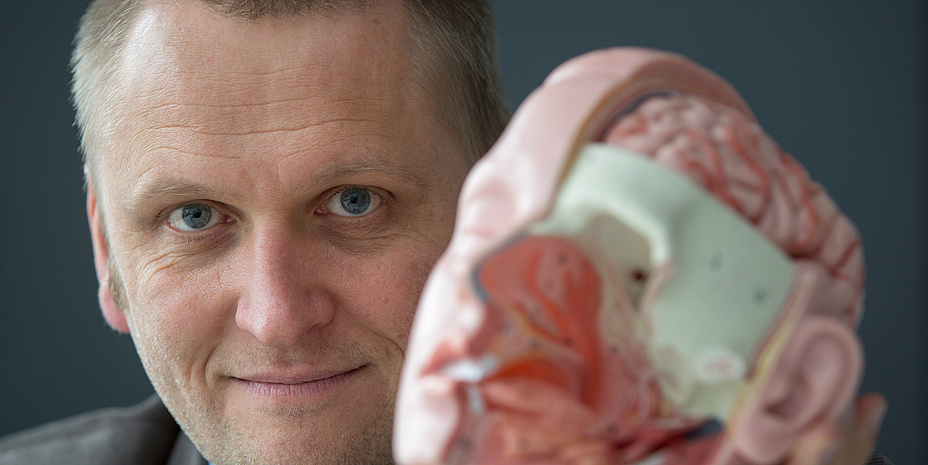Brain Composer: “thinking” melodies onto a musical score

Under the title of “Brain Composer”, a group led by BCI expert Gernot Müller-Putz from TU Graz’s Institute of Neural Engineering shows that experiences of quite a different tone can be sounded from the keys of brain-computer interfaces. Derived from an established BCI method which mainly serves to spell – more accurately – write by means of BCI, the team has developed a new application by which music can be composed and transferred onto a musical score – just through the power of thought. All you need is a special cap which measures brain waves, the adapted BCI, a software for composing music, and of course a bit of musical knowledge.
The basic principle of the BCI method used, which is called P300, can be briefly described: various options, such as letters or notes, pauses, chords, etc. flash by one after the other in a table. If you’re trained and can focus on the desired option while it lights up, you cause a minute change in your brain waves. The BCI recognises this change and draws conclusions about the chosen option.
Musical test persons
18 test persons chosen for the study by Gernot Müller-Putz, Andreas Pinegger and Selina C. Wriessnegger from TU Graz’s Institute of Neural Engineering as well as Hannah Hiebel, meanwhile at the Institute of Cognitive Psychology & Neuroscience at the University of Graz, had to “think” melodies onto a musical score. All test subjects were of sound bodily health during the study and had a certain degree of basic musical and compositional knowledge since they all played musical instruments to some degree. Among the test persons was the late Graz composer and clarinettist, Franz Cibulka. “The results of the BCI compositions can really be heard. And what is more important: the test persons enjoyed it. After a short training session, all of them could start composing and seeing their melodies on the score and then play them. The very positive results of the study with bodily healthy test persons are the first step in a possible expansion of the BCI composition to patients,” stresses Müller-Putz.Sideshow of BCI research
This little-noticed sideshow of the lively BCI research at TU Graz, with its distinct focus on disabled persons, shows us which other avenues may yet be worth exploring. Meanwhile there are some initial attempts at BCI systems on smart phones. This makes it easier for people to use BCI applications, since the smart phone as powerful computer is becoming part of the BCI system. It is thus conceivable, for instance, to have BCI apps which can analyse brain signals for various applications. “20 years ago, the idea of composing a piece of music using the power of the mind was unimaginable. Now we can do it, and at the same time have tens of new, different ideas which are in part, once again, a long way from becoming reality. We still need a bit more time before it is mature enough for daily applications. The BCI community is working in many directions at high pressure.PLOS ONE paper:
<link http: journals.plos.org plosone>“Composing only by thought: Novel application of the P300 brain-computer interface”. Andreas Pinegger, Hannah Hiebel, Selina C. Wriessnegger, Gernot R. Müller-Putz. PLOS ONE, 6 September 2017.
Graz as centre of BCI research
The international community for brain-computer interfaces is meeting at the Graz BCI Conference 2017 from 18th to 22nd September. It will end with a special event open to the public: a BCI Science Slam on Friday, 22nd September. Five researchers will stage their current topics using “mini-shows” lasting six minutes in a creative and easy-to-understand way, and the audience will vote for the winner of the Slam at the end. Entry is free of charge. You can find <link institute ine graz-bci-conferences graz-bci-conference-2017 satellite-events external link in new> information about the conference and the Science Slam here.
Kontakt
Univ.-Prof. Dipl.-Ing. Dr.techn.
TU Graz | Institute of Neural Engineering
Phone: +43 316 873 30700
Email: <link int-link-mail window for sending>gernot.mueller@tugraz.at



